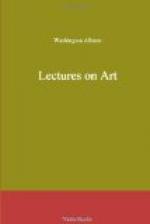But, although Beauty cannot sustain itself permanently against what is morally bad, and has no direct power of producing good, it yet may, and often does, when unobstructed, through its unimpassioned purity, predispose to the good, except, perhaps, in natures grossly depraved; inasmuch as all affinities to the pure are so many reproaches to the vitiated mind, unless convertible to some selfish end. Witness the beautiful wife, wedded for what is misnamed love, yet becoming the scorn of a brutal husband,—the more bitter, perhaps, if she be also good. But, aside from those counteracting causes so often mentioned, it is as we have said: we are predisposed to feel kindly, and to think purely, of every beautiful object, until we have reason to think otherwise; and according to our own hearts will be our thoughts.
We are aware of but one other objection which has not been noticed, and which might be made to the intuitive nature of the Idea. How is it, we may be asked, that artists, who are supposed, from their early discipline, to have overcome all conventional bias, and also to have acquired the more difficult power of analyzing their models, so as to contemplate them in their separate elements, have so often varied as to their ideas of Beauty? Whether artists have really the power thus ascribed to them, we shall not here inquire; it is no doubt, if possible, their business to acquire it. But, admitting it as true, we deny the position: they do not change their ideas. They can have but one Idea of Beauty, inasmuch as that Idea is but a specific phase of one immutable Principle,—if there be such a principle; as we shall hereafter endeavour to show. Nor can they have of it any essentially different, much less opposite, conceptions: but their apprehension of it may undergo many apparent changes, which, nevertheless, are but the various degrees that only mark a fuller conception; as their more extended acquaintance with the higher outward assimilants of Beauty brings them, of course, nearer to a perfect realization of the preexisting Idea. By perfect, here, we mean only the nearest approximation by man. And we appeal to every artist, competent to answer, if it be not so. Does he ever descend from a higher assimilant to a lower? Suppose him to have been born in Italy; would he go to Holland to realize his Idea? But many a Dutchman has sought in Italy what he could not find in his own country. We do not by this intend any reflection on the latter,—a country so fruitful of genius; it is only saying that the human form in Italy is from a finer mould. Then, what directs the artist from one object to another, and determines him which to choose, if he has not the guide within him? And why else should all nations instinctively bow before the superior forms of Greece?




